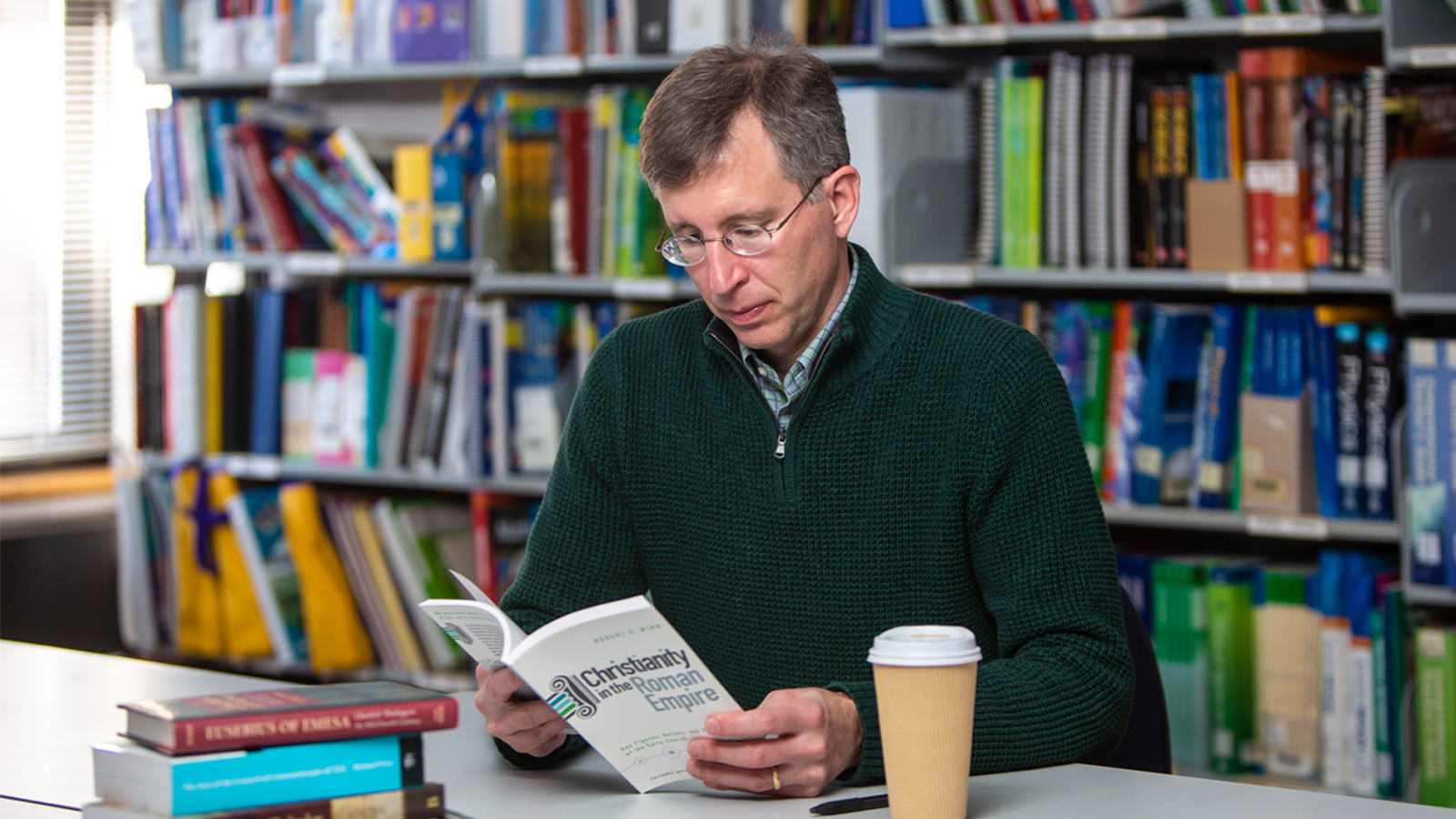Nine Northwestern College professors will conduct research and pursue further study this summer with funding from the Northwestern College Scholarship Grants program. The awards, ranging from $2,400 to $5,300, are designed to encourage the production of scholarly work for publication and distribution beyond Northwestern’s campus.
Theatre professor Molly Wiebe Faber will use her grant to fund historical research and interviews with Mennonite women whose sons, husbands, brothers and friends were conscientious objectors during wartime in America. Her goal is to eventually write, produce and perform a one-woman show based on what she learns.
Dr. Hyunsung Jun, associate professor of math and physics, will spend the summer at Seoul National University in South Korea studying quasars—or supermassive black holes fueled with mass—using modeling methods to determine the relationship between their continuum and line luminosities. Such methods will allow the astrophysics community to better analyze low-resolution infrared spectra. Jun plans to submit his findings to the Astrophysical Journal and to eventually involve undergraduate students in his research.
The Northwestern Scholarship Grant awarded to Dr. Juyeon Kang, professor of music, will support her work on a new solo piano CD of hymn arrangements—a sequel to her CD “Joyful Praise,” recorded in 2022. For “Joyful Seasons,” Kang plans to personally arrange hymns for specific church calendar seasons, including Christmas and Easter. Performances of her work will take place during the 2024–25 school year, and she will record the CD in the summer of 2026.
History professor Dr. Mike Kugler will use his grant to fund research at the University of Minnesota’s Wilson Library. While on sabbatical during the spring of 2024, Kugler studied early-modern English-language accounts of the life of Jesus. He’ll continue that research this summer, with the goal of sharing his findings in an academic paper, through conference presentations and in published articles.
Dr. Jiying (Jenny) Song, associate professor of business, will spend her summer studying the writings of Robert K. Greenleaf in the archives of Yale Divinity School’s library. Greenleaf was a Quaker thinker who, after retiring as director of management research at AT&T, founded the Center for Applied Ethics in 1964 and devoted his life to leadership studies. He published the landmark essay “The Servant as Leader” and coined the term “servant-leadership.” Song plans to draft an article on service-leadership, persuasion and coercion for publication in the International Journal of Servant-Leadership.
Dr. Sara Sybesma Tolsma, professor of biology, will use her grant to fund publication of the annotations of bacteriophages discovered by Northwestern students through the college’s partnership with the international SEA-PHAGES research program. Additional sequenced phage genomes will be annotated this summer by her student research assistant, Julia Kutz, a senior genetics, molecular and cellular biology major from Sheridan, Wyoming.
Tolsma will also spend a week at the University of Pittsburgh working with the director of the Pittsburgh Bacteriophage Institute who does all of the gene sequencing for the SEA-PHAGES project. There she will learn how to use a different prep kit with Northwestern’s Illumina MiSeq sequencing instrument, after which she will return and—with two colleagues—sequence phage genomes using the technique.
Dr. Cody Rozeveld, assistant professor of biology, will collaborate with Dr. Tolsma in sequencing, assembling and annotating phage genomes. Once an annotated phage genome is complete, he will write the associated manuscript and publish the genome in Microbiology Resource Announcements (MRA). Annotated genomes may also be published in GenBank or the non-peer-reviewed bioRxiv.
History professor Dr. Robert Winn will begin new research that he anticipates will support either a series of articles or a book on Arnobius of Sicca, an early Christian apologist and theologian. Winn plans to argue that Arnobius’ work, “Adversus Nationes,” should be taken seriously as a witness to how an educated, adult convert to Christianity in North Africa—in the midst of persecution by the Roman emperor Diocletian— both critiqued Roman polytheism and explained his understanding of his new religion.
Finally, Dr. Rachael Wittern, assistant professor of psychology, is creating a questionnaire to research the mental health of Ukrainian refugees in the United States. Her goal in collecting baseline data is to better understand any mental health challenges experienced by Ukrainian refugees and to potentially use that data to create appropriate interventions to decrease stress and improve the mental health of that population.




